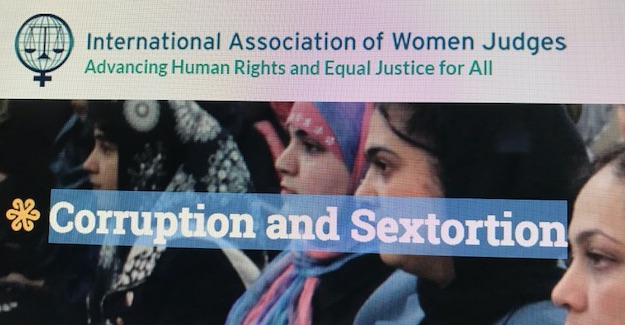Beyond Harvey Weinstein: Sextortion Around the Globe
Sextortion – the demand for sexual favors by powerful men – is especially prevalent in poor countries. It is the least investigated form of corruption in the world.
By Frank Vogl*
A shorter version of this article was first published on November 1, 2017 on The Globalist - https://www.theglobalist.com/sextortion-corruption-rape-womens-rights/
Consider, in 1995, at the international Beijing conference, then First lady Hillary Clinton declared that "women's rights are human rights."
Enormous progress has been made organizations dedicated to promoting the rights of women across the world since Beijing in 1995. But, not enough. We must do far more. And, as we seek to make progress, then we must place SEXTORTION right at the core of endeavors.
In a global context, there is something missing about the disclosures of media mogul Harvey Weinstein’s rampant abuse of women. So far, the focus has been mostly on cases in the United States and largely tied to entertainment and media celebrities.
It is time to turn the spotlight to other parts of the world where the scale of these sex crimes dwarfs anything seen in the United States and in Western developed economies.
“Sextortion” is one of the most pernicious forms of human rights abuse in poor nations. In fact, sextortion – the demand for sexual favors by powerful men – is the least investigated and reported form of corruption. Extortion for cash, in all its many forms, wins far more attention.
The term sextortion was first coined several years ago by the International Association of Women Judges the which has worked to bring attention to the issue and yet, it remains mostly neglected.
Unfortunately, to this day, few, if any, websites of the world’s major human rights, gender rights and anticorruption organizations mention sextortion.
Tragic examples
I first started to learn of individual sextortion stories about a decade ago when former Nigerian finance minister Ngozi Okonjo-Iweala gave a lecture in June 2007 in Washington, D.C. Ngozi told the story of Rose, a 21-year-old university student in Nigeria:
Rose, from a poor rural family, could not purchase the series of class notes sold by her lecturer to students as part of the reading material for her class. The lecturer, who used these moneys to supplement his income, noticed that Rose was not purchasing the notes and penalized her through low grades for her work.
When she explained she couldn’t pay she was asked to make up with other favors which she refused. The failing grade she was given was instrumental in her withdrawal from the university which put an end to her higher education.
An individual and an entire family lost their hope and pathway to escape poverty. When I followed up on this story, I found that it was by no means an isolated case. It was part of a systemic rot that had befallen what had once been a very good tertiary education system in Nigeria.
A global problem
Since that time, I have heard many more across the developing countries of Asia and Africa and Latin America and in Central and Eastern Europe.
Young women like Rose are being ruined by men in positions of power who, in totally premeditated ways, demand sex from their subjects. The women may be seeking to get through university, like Rose, or stay in a decent job, or just get employment.
In some countries, the extortion they suffer is not included in the criminal code under corruption, which is confined to crimes involving illicit financial payments. These laws need to be changed.
In many countries, women can all too easily be doubly victimized: First by sexual perverts; second, by their families, their communities and their religious institutions – if they let it be known that they have been raped.
Protection for women so they can report the crimes is essential. The perpetrators of sextortion know that in most cases they can act with impunity.
Lack of meaningful data
The fear that so many women have about reporting this form of corruption results in the lack of meaningful data on just how widespread the problem is. And without data, there is evident reluctance by official aid institutions, the United Nations and many other organizations engaged in development to focus on this crime against humanity.
As the number of Weinstein-related stories in the media soars far beyond American borders, so I hope the obvious connection will be made to the far larger scale of sextortion crimes across many countries where the topic remains taboo.
Can we expect U.S. action? Trump's own history!
It will not be easy to break the silence. A determined effort by Western governments could succeed, but how likely is this?
Right now, many members of the U.S. Congress – past and present – know they are being investigated and none seem likely to try and bring the spotlight on the global sextortion curse.
Given his own history, President Trump probably believes that many of the current stories are just “fake” news. Over at the U.S. State Department, Secretary Tillerson has been blunt in saying that promoting human rights is no longer a prime U.S. foreign policy goal.As the number of Weinstein-related stories in the media moves beyond American borders, I hope that, at long last, the obvious connection will be made to the largest form of sexual abuse of women in the world, by focusing on the far larger scale of sextortion crimes across many countries where the topic remains taboo.
It is high time to take the issue that creates so much misery to so many to the forefront of humanitarian concerns.
*Frank Vogl is a co-founder of Transparency International and the Partnership for Transparency. He is an adjunct professor at Georgetown University teaching a graduate corruption course. His articles regularly appear on The Globalist and at www.frankvogl.com
If you like this article and wish to share it and comment on it, please do so here or at https://www.theglobalist.com/sextortion-corruption-rape-womens-rights/
